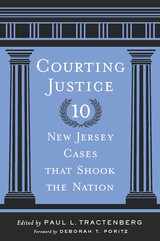
Paul Tractenberg has selected ten of the court’s landmark decisions between 1960 and 2011 to illustrate its extensive involvement in major public issues, and to assess its impact. Each case chapter is authored by a distinguished academic or professional expert, several of whom were deeply involved in the cases’ litigation, enabling them to provide special insights. An overview chapter provides context for the court’s distinctive activity.
Many of the cases are so widely known that they have become part of the national conversation about law and policy. In the Karen Ann Quinlan decision, the court determined the right of privacy extends to refusing life-sustaining treatment. The Baby M case reined in surrogate parenting and focused on the child’s best interests. In the Mount Laurel decision, the court sought to increase affordable housing for low- and moderate-income residents throughout the state. The Megan’s Law case upheld legal regulation of sex offender community notification. A series of decisions known as Abbott/Robinson required the state to fund poor urban school districts at least on par with suburban districts.
Other less well known cases still have great public importance. Henningsen v. Bloomfield Motors reshaped product liability and tort law to protect consumers injured by defective cars; State v. Hunt shielded privacy rights from unwarranted searches beyond federal standards; Lehmann v. Toys ‘R’ Us protected employees from sexual harassment and a hostile work environment; Right to Choose v. Byrne expanded state constitutional abortion rights beyond the federal constitution; and Marini v. Ireland protected low-income tenants against removal from their homes.
For some observers, the New Jersey Supreme Court represents the worst of judicial activism; others laud it for being, in its words, “the designated last-resort guarantor of the Constitution's command.” For Tractenberg, the court’s activism means it tends to find for the less powerful over the more powerful and for the public good against private interests, an approach he applauds.

In the quarter century since the landmark Karen Ann Quinlan case, an ethical, legal, and societal consensus supporting patients' rights to refuse life-sustaining treatment has become a cornerstone of bioethics. Patients now legally can write advance directives to govern their treatment decisions at a time of future incapacity, yet in clinical practice their wishes often are ignored.
Examining the tension between incompetent patients' prior wishes and their current best interests as well as other challenges to advance directives, Robert S. Olick offers a comprehensive argument for favoring advance instructions during the dying process. He clarifies widespread confusion about the moral and legal weight of advance directives, and he prescribes changes in law, policy, and practice that would not only ensure that directives count in the care of the dying but also would define narrow instances when directives should not be followed. Olick also presents and develops an original theory of prospective autonomy that recasts and strengthens patient and family control.
While focusing largely on philosophical issues the book devotes substantial attention to legal and policy questions and includes case studies throughout. An important resource for medical ethicists, lawyers, physicians, nurses, health care professionals, and patients' rights advocates, it champions the practical, ethical, and humane duty of taking advance directives seriously where it matters most-at the bedside of dying patients.
READERS
Browse our collection.
PUBLISHERS
See BiblioVault's publisher services.
STUDENT SERVICES
Files for college accessibility offices.
UChicago Accessibility Resources
home | accessibility | search | about | contact us
BiblioVault ® 2001 - 2024
The University of Chicago Press









